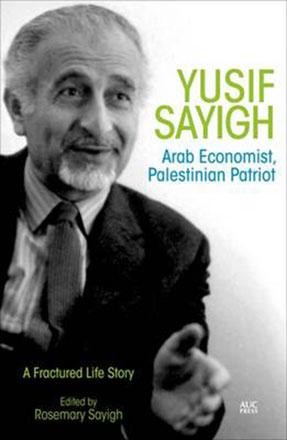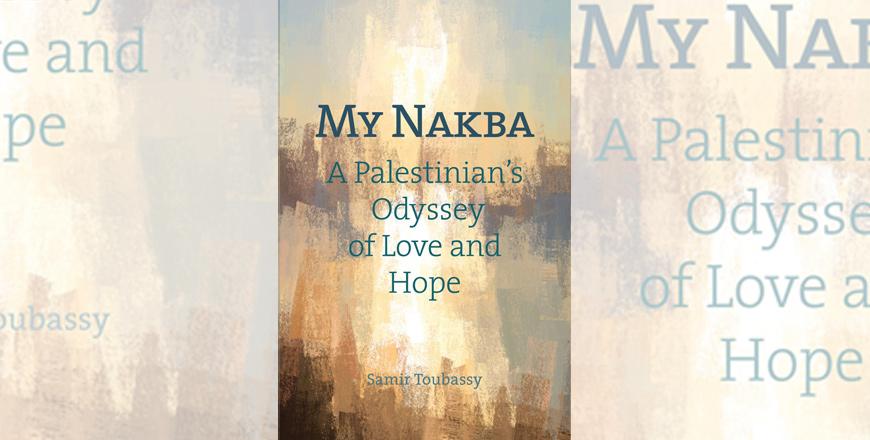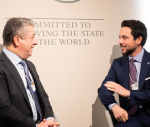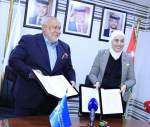You are here
A lifetime of commitment to justice
Aug 23,2015 - Last updated at Aug 23,2015

Yusif Sayigh: Arab Economist, Palestinian Patriot — A Fractured Life Story
Edited by Rosemary Sayigh
The American University in Cairo Press, 2015
Pp. 388
It is true as indicated in the book title that Yusif Sayigh’s life story is fractured: He and his family were often on the move; like all Palestinians, his life was cruelly disrupted by the violent creation of Israel; later, his carefully charted economic plans were thwarted by the self-serving, upper tier of the PLO leadership. Moreover, the memoir itself covers his youth more thoroughly than his mature, most productive years as an economist. Yet, despite these fractures, the voice that rings out in this book is totally coherent, full of logic, intellect and compassion, and tinged with sly wit.
Sayigh was too busy in his lifetime (1916-2004) to write his memoirs. Luckily, Rosemary Sayigh, his wife and fellow intellectual and activist, made him speak into a tape recorder in April 1989, during a bout of illness, and in snatches thereafter. An anthropologist who has recorded extensive oral histories of camp Palestinians, she must have found it ironic that Yusif did not count himself among the “proper subjects of memoirs. He did not accept the idea that ordinary people can contribute to a richer understanding of history through their memory and witness”. (p. 5)
In this case, he was wrong. Thanks to Rosemary’s perseverance, his memoir stands as a precious example of a life that successfully combined professional brilliance with political and moral convictions. It is also a document of everyday life in the early 1900s and a bird’s-eye view of the famous and not so famous people and events that constitute contemporary Palestinian history.
The first third of the narrative is very much about family, a charming account of a simple but adequate village life. Due to his father’s vocation as a Protestant minister, the Sayighs had limited means but there was much love and caring. As they move rather seamlessly from Al Bassa in northern Palestine, to Karaba in southern Syria, back to Al Bassa, and later to Tiberius, one re-envisions the continuity of Bilad Al Shem, despite the recent colonial division. Yusif’s very life attests to this continuity as he attends boarding school in Sidon, the American University in Beirut (AUB), and works in Tikrit, Tiberius, Jerusalem and Beirut. Equally striking is the priority his parents accorded to their children’s education.
Sayigh’s earliest political memory is questioning France’s occupation of Syria. Studying at the AUB sharpened his awareness and honed his inquisitive mind: “The day didn’t have enough hours in it for all the things I wanted to do. I attended every lecture that sounded interesting.” (p. 115)
One gets a taste of the political discussions of the 1930s as Sayigh recalls the thinkers who influenced him from Charles Malek and Constantine Zurayk to Antoun Saadeh, who drew him into the Parti Populaire Syrien (PPS).
Upon obtaining his BA, Sayigh began working to support his brothers’ education, eventually leading him to Jerusalem. He traces his gradual shift from the PPS’ Syrian nationalism to Palestinian nationalism seen in a broader Arab context. Working for the Arab National Treasury in 1946, he was co-inventor of a plan for all Palestinians to contribute, each according to their means, to a fund for defending their country from the looming Zionist assault. Unfortunately, there was not enough time and the traditional leadership did not realise the imperative of sustained, organised efforts. In the end, Sayigh was trapped in Qatamoun and taken prisoner when it was overrun by the Zionist forces. His account of his time in Jerusalem, the last minute efforts to save the city, and almost a year as a POW, when he was unanimously elected to be the prisoners’ spokesman, give a rare glimpse into a little-publicised chapter of Palestinian history.
It is beyond the scope of this review to name all the positions Sayigh held. Suffice it to say that after obtaining a PhD in economics, he became the PLO’s major economist, but was constantly frustrated by the leadership’s refusal to work according to systematic plans. In 1988, he was assigned to prepare a study on the economic underpinnings of a Palestinian state to be implemented, he assumed, after political independence, but he was kept in the dark about the ensuing Oslo talks, and had to stand by watching as president Arafat hijacked the rational, transparent structure his plan called for. This caused Sayigh to leave Tunis and return to scholarly work in Beirut, where, tragically, he was faulted by those who felt he had facilitated the Oslo accords.
In the last chapter on Yusif’s economic thinking, written by Rosemary, as this was not recorded, she ends with a note of hope: “Yusif’s Palestine Development Programme has been rediscovered by a younger generation of economists critical of the National Authority’s laissez-faire liberalism, dependency and failure to achieve growth or welfare.” (p. 323)
His conviction that development must involve social justice is just as relevant today as when set out in his 1961 book, “Bread With Dignity”, which predicted the thrust of the 2010 Arab uprisings.
Related Articles
I was touched by Michael Jansen’s review of Yusif Sayigh’s memoirs in the July 9 edition of The Jordan Times, but I would like to point out
My Nakba: A Palestinian’s Odyssey of Love and HopeSamir ToubassyUS: Olive Branch Press/Interlink, 2019Pp.
The Lanterns of the King of GalileeIbrahim NasrallahTranslated by Nancy RobertsAmerican University in Cairo Press, 2014Pp.
















